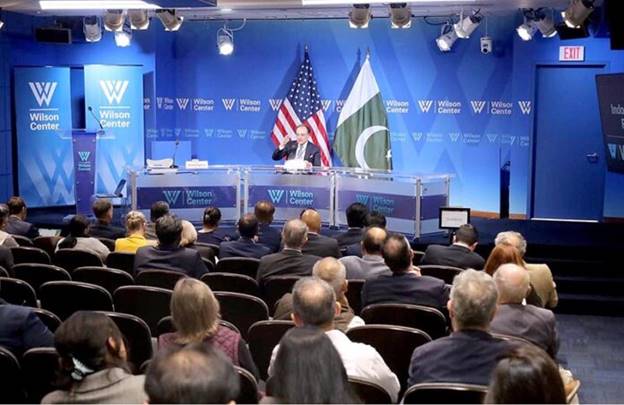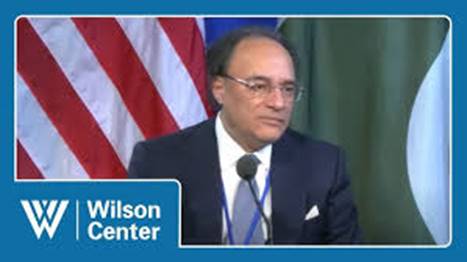

On the positive side, Aurangzeb noted that over the last 12 to 14 months Pakistan hasmade significant tangible progress in terms of macroeconomic stability - APP
Aurangzeb Spotlights Pakistan’s Economic Outlook at Washington’s Wilson Center
By Elaine Pasquini

Washington: On October 23, 2024, in a break from his schedule of meetings during a busy week in Washington to attend the International Monetary Fund (IMF) and World Bank fall meetings, Pakistan’s Finance Minister Muhammad Aurangzeb briefed a Wilson Center audience on Pakistan’s economy and its financial outlook for the future.
Following introductions by Michael Kugelman, director of the Wilson Center’s South Asia Institute, and the Center’s president and CEO Ambassador Mark A. Green, the finance minister began with a description of Pakistan’s efforts to stabilize and grow the economy.
On the positive side, Aurangzeb noted that over the last 12 to 14 months Pakistan has made significant tangible progress in terms of macroeconomic stability. By the end of the fiscal year which runs from July 1 to June 30, the country had “manifestations of this macroeconomic stability through various markers which all went in the right direction,” he related. After 19 years, Pakistan had a primary surplus on the fiscal side and the current account deficit was less than $1 billion, reduced from $17 billion a few years back.
In addition, by the end of the fiscal year, Pakistan had a stable currency, the foreign exchange reserves had remarkably improved, and inflation was on a downward trajectory. “We saw the beginning of the policy rate coming down and we saw the first reduction coming through before the fiscal year ended.”
As a result of this macroeconomic stability and despite other problems, the country was able to repay “a little over $2 billion in May and June to our existing international investors,” Aurangzeb reported.
“We started this fiscal year on a relatively clean slate and a relatively good note,” he said. And at the end of the first quarter, “we have consolidated those gains.” With remittances and a stable currency and IT exports holding strong, Pakistan had a current account surplus two months in a row, in August and September, he added.

With remittances and a stable currency and IT exports holding strong, Pakistan had a current account surplus two months in a row, in August and September
Most importantly, however, inflation dropped from a high of 38 percent in September to 6.9 percent, which is a 44-month low, Aurangzeb said. The country’s credit rating has increased to the tripleC+ range, but it needs to increase even more in order to get back into the international capital markets, he noted. And, with the stock market hitting an all-time high recently, “We’re moving in the right direction!”
All of this came on the back of the successful conclusion of the nine-month SBA (stand-by agreement) with the IMF. In April, Pakistan agreed to engage with the fund for an extended larger program and in September the IMF gave approval for a $7 billion 37-month program.
This is necessary, Aurangzeb explained, to bring permanence to the macroeconomic stability, which is extremely important. “We need this foundation on which we can then move towards building and going for growth. We’ve also seen some of the FDI (foreign direct investment) coming into the country. It’s trickling in.”
To encourage foreign direct investment, the Special Investment Facilitation Council was created in June 2023 to ease doing business for foreign companies and cut down the red tape. “From my standpoint, it’s a very practical and pragmatic forum,” he stated.
With respect to Pakistan’s debt, overall, “the debt to GDP, which was 75 percent, has come down to 67 percent,” but also “the composition of our external debt is primarily multilaterals and bilaterals,” he said.
“As far as the domestic situation is concerned,” he stated, “given the macroeconomic stability…we were able to retire close to $1 trillion rupees in domestic debt…which basically gives a signal to the market that we are in no desperation to borrow and, if we do borrow, we will do it on our terms.”
The finance minister, who previously spent 35 years in the international banking world, called the issue of making structural reforms a “defining moment for the country.” These structural reforms include energy, state-owned enterprises, privatization, and taxation.
With respect to taxation, Aurangzeb explained, the country is reforming the tax authority in terms of people, process, and technology in order to restore confidence in the department.
In addition, there is the need to re-establish untaxed or undertaxed segments such as real estate, agriculture and retail and wholesale distributors, the finance minister said.
Aurangzeb pointed out that the government had recently signed the National Fiscal Pact with the provinces because some of these taxation elements fall under the purview of the provinces.
Privatization measures are also continuing. “The government should provide policy framework and continuity,” he said, “but it is really the private sector that should lead the country.” Productivity, however, in the private sector must go up for that to happen.
Noting the country is in a coalition government, he said there was a huge pushback against many of these ideas. There will be adjustment and pain in the short-term around some of the decisions being made, “but the reality is as a country our hand has been forced,” he insisted. “We need to do what we need to do” in order that Pakistan does not need to keep receiving assistance from IMF programs.
In addition, however, to the necessary structural reforms for the economic turnaround over the next two to three years, Pakistan is dealing with climate change, a population growth of 2.55 percent, and child-stunting which needs to be dealt with immediately. “The country of 240,000 million is already struggling and with this growth rate it will not be easy,” he concluded.
(Elaine Pasquini is a freelance journalist. Her reports appear in the Washington Report on Middle East Affairs and Nuze.Ink.)

